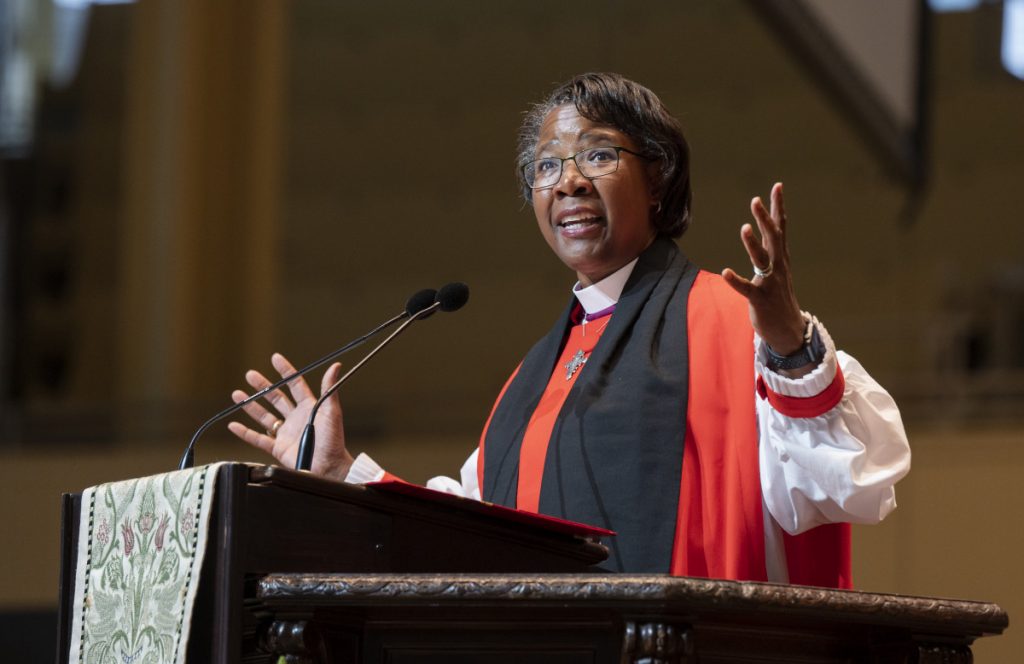MARY LEE TALBOT – STAFF WRITER

In Mark’s gospel “there are no angels, no lilies, no ham or lamb dinners, no ‘go big or go home’ expectations of the resurrection,” said the Rt. Rev. Jennifer Baskerville-Burrows. “Mark’s gospel begins plainly, ‘The beginning of the good new of Jesus Christ, the Son of God,’ and it ends just as plainly, ‘So they went out and fled from the tomb, for terror and amazement had seized them; and they said nothing to anyone, for they were afraid.’ ”
Baskerville-Burrows preached at the 9 a.m. worship service Tuesday, Aug. 3, in the Amphitheater. Her sermon title was “Joanna, Mary, and Salome.” The Scripture text was Mark 16:1-8.
After all the drama of the healings, preaching and confrontation with the religious authorities, Jesus was arrested and was put to death. “Mark’s ending is muted,” said Baskerville-Burrows, “yet that quiet ending is also a terrifying beginning — what happens next?”
Aug. 3 is a lesser feast in the Episcopal Church calendar — the feast of Joanna, Mary and Salome. “We celebrate them today. They expected to tend a body, but they had the courage to announce what they had seen. Where would we be without these women?” Baskerville-Burrows asked.
She said it was only recently that the Western Christian church has celebrated these women. They have been celebrated for centuries in the Orthodox churches. “These three women, and the eight others who are mentioned in the gospels, bear witness to the truth of Jesus’ words that he would go before them and the futility of the task they were trying to carry out. We tend to gloss over the truth of what we believe about death and about women.”
Baskerville-Burrows continued, “We tend to gloss over Easter Saturday and move swiftly from Good Friday to Easter morning. These women help us to understand death and how to meet tragedy with tenderness; how to live after dying.”
When Baskerville-Burrows was working on the staff of the Episcopal Diocese of Chicago, there was an epidemic of gun violence. “No one was paying attention,” she said. “By that I mean the people who had agency and power accepted the situation as normative. In this country we are anesthetized by the numbers of people dying in car accidents, from COVID and gun violence.”
She worked with a group of people who wanted everyone to understand that those deaths by gun violence were the concern of all. “Those children are our children,” she said.
The group closed down traffic with matches, established job training and internship programs, and they listened to the testimony of women who lost children. One such group of women was Mothers Against Senseless Killings (MASK).
“They wore pink T-shirts and went out every day to enforce the safe passage of children to and from school,” Baskerville-Burrows said. “They did what needed to be done to protect each other’s children in territory disputed by gangs. Their night of weeping led to joy in the morning to see the children home safely.”
These mothers also lifted up stories of the children they had lost. “They knew nothing could bring them back, but they showed there was living after dying,” Baskerville-Burrows said. “It was hard and painful to hear, but we were convicted and just let it happen. They were denied a happy ending, but they were compelled to act to overcome their helplessness, and compelled to do something.”
Mark’s gospel ends in an unresolved place, yet the empty tomb and the women’s sadness points to a way forward. Something had happened to Jesus, and the disciples went into hiding, but after the news of the empty tomb and Jesus’ appearances, “something in them was set free and they were liberated to work in the world,” she said.
Baskerville-Burrows told the congregation, “We are in the same situation today. We don’t know the way forward after the raging virus. Our communities have problems, as do our country and our planet. In the midst of this situation, the women come and witness to what they have seen and heard. Jesus is going ahead of them and God is making resurrection happen now.”
She continued, “Resurrection is not just for the dead, but for the living. On this day we remember Joanna, Mary and Salome. Jesus kept his promise to transform death and heartbreak. The women told the truth and our response is to practice and proclaim resurrection now, today and every day.”
The Rev. Natalie Hanson presided. James Denvil, an actor and attorney from Baltimore, read the Scripture. The prelude was “Gabriel’s Oboe,” by Ennio Morricone, played by George Wolfe, saxophone, and Joseph Musser, piano. Wolfe is a Yamaha artist and a professor emeritus at Ball State University, where he taught saxophone performance and chamber music for 32 years. Musser is a member of the Motet Consort. Members of the Motet Choir sang “When Mary Thro’ the Garden Went,” with music by Charles Villiers Stanford and words by Mary E. Coleridge. Joshua Stafford, who holds the Jared Jacobsen Chair for the Organist and is director of sacred music, played an improvisation for the postlude. The J. Everett Hall Memorial Chaplaincy and the Harold F. Reed Sr. Chaplaincy provide support for this week’s services and chaplain.




